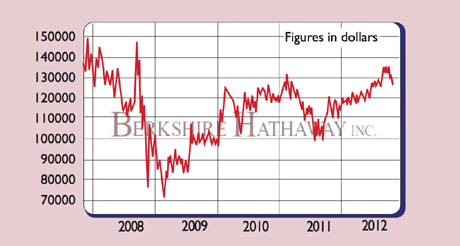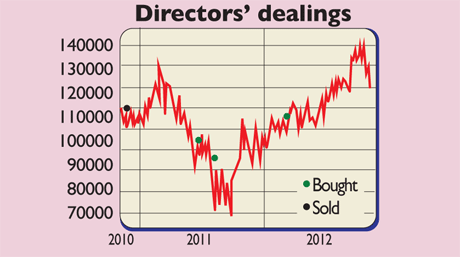Shares in focus: Should you get on board with Buffett?
Warren Buffett is arguably the world's greatest living investor, says Phil Oakley. So, should you buy shares in Berkshire Hathaway?
Get the latest financial news, insights and expert analysis from our award-winning MoneyWeek team, to help you understand what really matters when it comes to your finances.
You are now subscribed
Your newsletter sign-up was successful
Want to add more newsletters?

Twice daily
MoneyWeek
Get the latest financial news, insights and expert analysis from our award-winning MoneyWeek team, to help you understand what really matters when it comes to your finances.

Four times a week
Look After My Bills
Sign up to our free money-saving newsletter, filled with the latest news and expert advice to help you find the best tips and deals for managing your bills. Start saving today!
Berkshire Hathaway's legendary CEO is no guarantee of spectacular returns, says Phil Oakley.
The business
Berkshire Hathaway is a throwback to the days of big conglomerates this is a business with its fingers in many pies. Its biggest business is insurance and reinsurance where it trades under the names of Geico, General Re and Berkshire Hathaway Reinsurance.
It has a further 68 businesses in other areas. It owns Burlington Northern Sante Fe, which is one of the largest railroad networks in North America, and MidAmerican Energy, one of the country's biggest utilities.
MoneyWeek
Subscribe to MoneyWeek today and get your first six magazine issues absolutely FREE

Sign up to Money Morning
Don't miss the latest investment and personal finances news, market analysis, plus money-saving tips with our free twice-daily newsletter
Don't miss the latest investment and personal finances news, market analysis, plus money-saving tips with our free twice-daily newsletter
Berkshire's other business interests range from chemicals, private jets and furniture stores to manufacturing companies and newspapers. It is also a big investor in the stockmarket, owning large stakes in companies such as Coca-Cola, IBM, Wells Fargo, American Express and Procter & Gamble.
The history
The history of Berkshire Hathaway can be traced back to the 19th century, but today's company really began in 1965. That was the year Warren Buffett gained a majority share in what was then a textile business. By 1967, the company was losing money and Buffett realised that he had to diversify his sources of profit. He set about buying two Omaha-based insurance businesses and then followed this with some weekly newspaper titles in 1968.
The 1970s saw Berkshire expand its insurance business, but also start to build up its investment portfolio, buying stakes in insurance company Geico and The Washington Post. By the mid-1980s Buffett realised that the textile business was a lost cause and sold the business. Berkshire then spent the rest of the decade buying stakes in prominent businesses such as ABC, Coca-Cola and Gillette.
In 1995, Berkshire bought the whole of Geico, which gave it tremendous scale in insurance and with it a pool of free money known as float to make investments. The strategy of growing the insurance business and reinvesting profits in new business has been phenomenally successful.
Since 1965, the net asset value per share of Berkshire Hathaway has grown at an average annual rate of 19.8%. This is compared with 9.2% for the S&P 500 index. Many long-term shareholders have become very rich.
However, as Berkshire has ballooned in size, it has become much harder for it to keep growing. It has needed very big acquisitions, such as railroad Burlington Northern Sante Fe, to make much of a difference. Buffett still knows how to get a good deal, though the credit crisis allowed him to make some very shrewd purchases, such as the preference shares of Goldman Sachs, General Electric and Bank of America.
The chief executive
Warren Buffett has run Berkshire Hathaway since 1965. He is arguably the world's greatest living investor. After working for legendary value investor Benjamin Graham, he set up his own investment partnership in 1956. Six investors gave him a total of $105,000 to manage. Buffett invested just $100 of his own money.
By taking a share of the partnership's profits and reinvesting them, he made a fortune. He closed his partnership in 1967 with $9m. He is now worth an estimated $44bn, making him the world's third richest man. His basic salary for running Berkshire Hathaway is a very modest $100,000.
Should you buy the shares?
You have to be pretty wealthy just to be able to buy one share of Berkshire Hathaway (see below). However, the B' shares trade at a more manageable $85. But should you get on board?
One thing's for sure the profits of the insurance business will move up and down a lot. On the other hand, the company's railroad and utility investments are expected to keep on going up. Berkshire's profits are complicated by derivative contracts which Buffett once called "financial weapons of mass destruction".
Berkshire has sold put options (a type of down-bet) to some investors based on the value of various equity indices starting in 2018. Basically, if stock prices rise, Berkshire will make money. If they go down, it will lose money.
But every year, the estimated profit or loss on these contracts has a big impact on Berkshire profits and net asset value. Despite a lot of faith in the ability of Buffett to keep making shareholders richer, it's by no means certain that the numbers stack up.
Last year, the business made profits of $10.2bn on equity invested (or book value) of $165bn a return of just 6.2%.
That's not very good and suggests that the shares should not be worth much more than their book value. But bear in mind that a large chunk of Berkshire's book value is tied up in shares where it only gets a low percentage dividend return. On top of that its derivatives lost money. This tells us that Berkshire's other businesses make decent, but not spectacular, profits.
But can they grow? We're not sure they can grow fast enough to make much of a difference to shareholders. This means that Berkshire has to make big acquisitions at good prices to achieve decent growth. This will be hard to do.
Splashing out on the shares of companies like IBM is probably a sign that Berkshire expects to make modest rather than great returns. Buffett, at 82, may be past his best and Berkshire may be too big. Given this, and the fact that you get no dividend for holding Berkshire shares, we are not tempted. You may be better off buying a cheap S&P 500 index fund.
VERDICT: AVOID
The numbers

Stockmarket code: BRK.A
Share price: $127,318
Market cap: $210.9bn
Net assets (June 2012): $177.4bn
Net debt (June 2012): $20.5bn
P/e (current year estimate): 16.4 times
Yield (prospective): 0%
Price to book value: 1.2 times
What the analysts say
Buy: 4
Hold: 1
Sell: 0
Average price target: $148,750
Directors' shareholdings

W Buffett (CEO): 350,000
C Munger (dep. chairman): 6,235
M Hamburg (CFO): N/A
Get the latest financial news, insights and expert analysis from our award-winning MoneyWeek team, to help you understand what really matters when it comes to your finances.
Phil spent 13 years as an investment analyst for both stockbroking and fund management companies.
-
 Can mining stocks deliver golden gains?
Can mining stocks deliver golden gains?With gold and silver prices having outperformed the stock markets last year, mining stocks can be an effective, if volatile, means of gaining exposure
-
 8 ways the ‘sandwich generation’ can protect wealth
8 ways the ‘sandwich generation’ can protect wealthPeople squeezed between caring for ageing parents and adult children or younger grandchildren – known as the ‘sandwich generation’ – are at risk of neglecting their own financial planning. Here’s how to protect yourself and your loved ones’ wealth.
-
 Somero: trading this overlooked bargain
Somero: trading this overlooked bargainFeatures Mechanical-screed maker Somero dominates its niche and is attractively valued. Matthew Partridge picks the best way to trade it.
-
 How to find big profits in small companies
How to find big profits in small companiesCover Story The small- and micro-cap sectors are risky and volatile. But with careful research and patience, investors could make huge gains. Matthew Partridge explains how to find the market’s top tiddlers.
-
 The hidden gems on Aim, London's junior market
The hidden gems on Aim, London's junior marketFeatures Aim, London’s junior market, is risky – but you can find solid stocks at low prices. Scott Longley reports.
-
Three Aim-listed firms that will thrive in a post-Brexit world
Opinion Matt Tonge and Victoria Stevens of the Liontrust UK Smaller Companies Fund pick three Aim-listed firms that will survive Brexit turmoil.
-
Fetch! The Chinese small-cap stocks to buy in the Year of the Dog
Opinion Each week, a professional investor tells us where she’d put her money. This week: Tiffany Hsiao of Matthews Asia selects three Chinese small-cap stocks with exciting potential.
-
Small and mid-cap stocks with big potential
Opinion Professional investor Guy Anderson of the Mercantile Investment Trust selects three small and medium-sized firms with promising prospects that the market has missed.
-
 Get cheap, reliable growth from smaller companies
Get cheap, reliable growth from smaller companiesFeatures One of the most reliable long-term investment trends is the long-term outperformance of smaller companies over blue chips. Max King picks some of the best ways to buy into this growth.
-
 Now the bitcoin bubble’s burst, what’s the next big thing?
Now the bitcoin bubble’s burst, what’s the next big thing?Features Forget bitcoin, if you want to increase your wealth faster than most other people, you need to find the next big thing. Merryn Somerset Webb suggests some places to look.